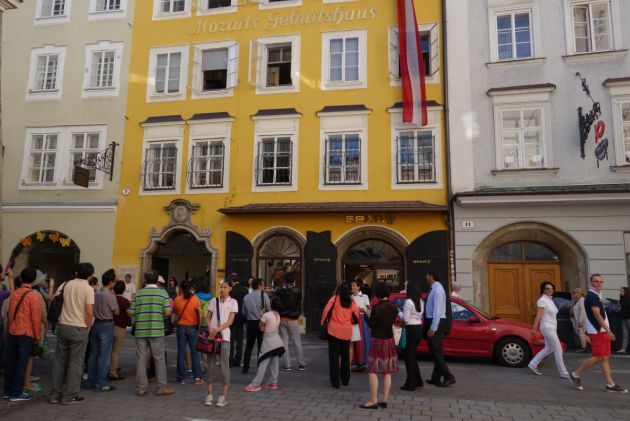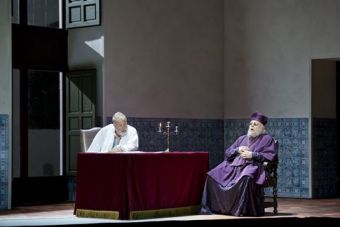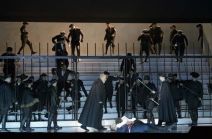Don Carlo's operatic torment reflects times of inquisitors and feudal kings

SALZBURG, Austria - Don Carlo was the operatic highlight at the Salzburg Festival celebrating the bicentenary of Giuseppe Verdi's birth in one of the most beautiful of the Italian composer's works.
It took place during the annual festival in Salzburg that runs till September in the stunning baroque Austrian city that was the birthplace of Mozart in a musical extravaganza celebrated globally.
Don Carlo raises a number of subjects in complex human relations such as fidelity, jealousy, forbidden love, individual and religious freedoms and the evergreen issue of father and son estrangement.
The opera takes place during the reign of Spanish King Philip II who had a penchant for burning people deemed heretics.
Don Carlo is the tormented, vulnerable, passionate son of King Philip who has taken his fiancée away to become the Queen.
Jonas Kaufmann excels as Don Carlo in a passionate and moving interpretation in the production at the Grosses Festspielhaus.
The scenes are reminders that Christianity in the times of the Inquisition once had some primitive practices.
Then persons with power could condemn opponents as heretics in the same way that some Muslims use their faith to persecute believers not akin to them with the curse of blasphemy when disagreements arise in some countries these days.
ANTI-CLERICAL VERDI
Verdi was known to be anticlerical, although the inquisition in Spain happened hundreds of years before the opera. The Grand Inquisitor is not portrayed well and the fate of Don Carlo and Elisabeth follows the political course he maps out.

In the opera he comes across effectively as a ruthless manipulator vehemently opposed to new ideas.
Some critiques of the early performances of Don Carlo lambasted the heretic burning scene and the set, but the audiences for the most part loved it.
"The Salzburg Festival's new Don Carlo staging is an object lesson in sumptuous emptiness. Throwing everything that money can buy at a production is no guarantee of excellence," wrote Shirley Apthorp of the Financial Times.
"Peter Stein, who has been sinking ever further into his own conservatism in recent years, has outdone himself in cringe-inducing dullness with this", production."
The New York Times also panned the stake-burning scene.
"Musically, though, the production is superb," wrote Times critic George Loomis on August 27. "The soprano Anja Harteros's vocalism may not be flawless but she gives a thoroughly involved, grippingly sung portrayal of an Elisabeth unafraid to show her love for Carlo.
"The tenor Jonas Kaufmann, in sterling voice, sings heroically but also conveys a sense of Carlo's nervous instability, especially when confronting his father about Spain's oppression of Flanders. Ms. Harteros and Mr. Kaufmann give a gorgeous, hushed performance of the magnificent final duet in which they sing of meeting in a better world."
Euronews headlined its review on August 29, "Don Carlo's sensational cast delights Salzburg audiences."
"A sensational cast made this production utterly prestigious, with this music conveyed by Maestro Pappano's talent and exquisite musicality," said Euronews.
The Daily Telegraph's Rupert Christiansen raved about the performer doing Elisabeth.
"Complaints of the current dearth of great Verdi sopranos must cease until further notice: we are living through the prime of Anja Harteros, a singer with the beauty of timbre, dignity of style, amplitude of voice and grandeur of presence to rival Leontyne Price, Rosa Ponselle and more distant legends.
SUBLIME ELISABETH
"Her Elizabetta [Elisabeth] in Salzburg's new production of Don Carlo is quite simply sublime: majestically phrased, rich in nuance, clear of diction and moving easily from immaculately floated pianissimo to sterling fortissimo. Her "Tu che le vanità" takes us as near to heaven as we earthlings will ever reach."
Many audiences found the stark sets reinforcements for the huge cast as mesmerising.

Even though tickets do not come cheaply in Salzburg is obvious the opera with a cast festival is heavily sponsored to the tune of millions of dollars from companies such as Audi, Omega, Nestlé and Siemens.
The finale of the six week festival of 280 performances in 45 days that brought musicians and classical music lovers from all over the world was on Sunday, but next year it will be back.
And The Salzburg Whitsun Festival (Salzburger Pfingstfestspiele) is an extension of the traditional Salzburg Summer Festival.
Nestlé and Salzburg Festival Young Conductors Award was another highlight which was won this year by Briton Ben Gernon who studied tuba and conducting at the Guildhall School of Music and Drama.
For his performance at the prize-giving on August 17, he masterfully conducted two widely varying pieces in an authoritative style that is not easy to mimic.
"You have shown innovation and that is what look for in sponsoring this event," Nestlé's chairman Peter Brabeck-Letmathe told Gernon after handing him the trophy "We wish to support the careers of these young talents with this platform."
With mature dexterity Gernon bravely conducted the Vienna-based Gustav Mahler Youth Orchestra playing Beethoven's Violin Concert and Orchestra in D, opus 61 with a virtuoso solo performance by violinist Arabella Steinbacher, whose father in German and mother is Japanese. This was followed by Prokofiev's tricky fifth symphony, showing why Gernon was the winner.
Classical music is labor-intensive and opera does have the following of pop music although it has a huge following. Many children who turn to pop start with classical training. For the sake of all music let's hope big business continues to support classical music and up-and-coming musicians like Gernon and Steinbacher.
Peter Kenny's attendance at the Salzburg festival was subsidised by Nestlé.